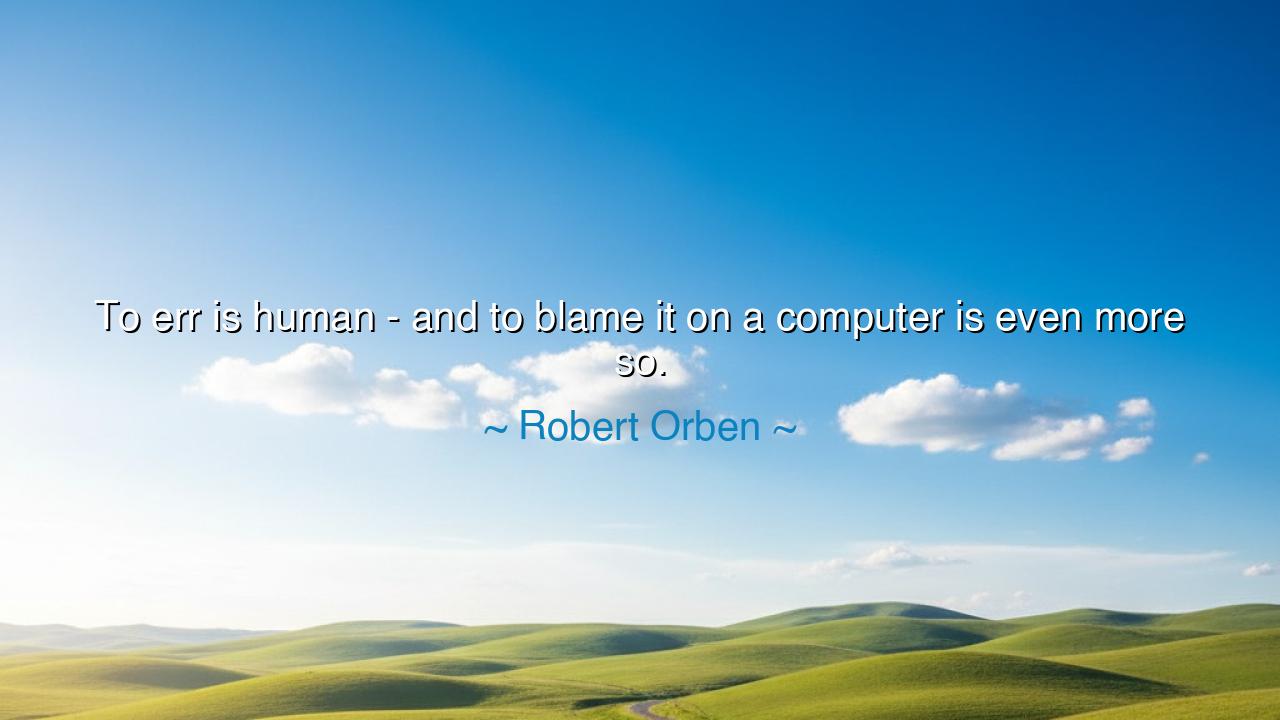
To err is human - and to blame it on a computer is even more so.






"To err is human – and to blame it on a computer is even more so." These words, spoken by Robert Orben, capture the essence of human nature in the modern age, a time when technology has woven itself into the very fabric of our existence. To err is a fundamental truth of the human condition. We, as beings of flesh and blood, are flawed, susceptible to mistakes, and ever learning from our failures. This is a truth that has echoed through the annals of history, from the fall of ancient civilizations to the struggles of the heroes who sought to rise above their faults. But in our age of digital omnipresence, there is a peculiar tendency to shift the blame for our errors onto the very tools we have created to serve us.
Orben's quote highlights a deeply human inclination: the need to deflect responsibility when things go wrong. It is one thing to make a mistake, for mistakes are the mark of our journey, our striving toward wisdom. But it is another to hide behind an external force—be it fate, chance, or, in our time, the computer. The irony in this lies not just in the passing of blame, but in the fact that the computer itself, though a creation of human ingenuity, has become a scapegoat. The computer, this marvelous invention designed to assist and enhance human potential, is now often blamed for our failures, as if it were somehow responsible for our own actions, decisions, or lack of foresight.
History, however, has long been full of such tendencies. Consider the story of Galileo Galilei, who, centuries ago, fought against the prevailing understanding of the cosmos. When he looked through his telescope and saw a universe that defied the beliefs of the time, he was ridiculed, imprisoned, and forced to recant. Galileo made an error, not in his observations, but in the very human act of challenging the status quo. His story is one of resilience in the face of ignorance, but also of the dangers of denying truth for the sake of convenience. Today, we face a different kind of error: a refusal to take responsibility, masked under the guise of technological failure.
There is a valuable lesson in Orben's quote: to err is part of the human condition, but to blame our errors on an inanimate tool—whether a computer, a machine, or any other device—is a greater folly. It is a refusal to accept that we, as individuals, are responsible for our choices. Just as the great philosophers of old, such as Socrates, urged us to “know thyself” and take responsibility for our actions, so must we in this modern world recognize that technology is merely a tool. It is neither our master nor our savior; it is a reflection of the choices we make in how we use it.
In this age of rapid technological advancement, it is easy to look at the complexities of the digital world and assume that the mistakes that arise from its use are not our own. Yet, just as the printing press did not cause chaos in the minds of those who misused it, the computer does not make decisions for us. The human element—the choice to act with integrity, to learn from our mistakes, and to face our shortcomings—is what shapes the world we live in. A computer may malfunction, yes, but it is our responsibility to correct the course. We are the ones at the helm.
Consider how often, in moments of frustration, we hear the words, “It’s the computer’s fault.” The computer may indeed encounter errors, but is it not the user who commands it? The computer follows instructions, executing them with exactitude, but it cannot think, reason, or choose. It does not know the difference between right and wrong. The blame we cast upon it is the modern equivalent of blaming a sword for a wound—an absurd notion, for the sword is merely an instrument, and it is the hand that wields it that decides its purpose.
The lesson is clear and must be carried forward into our own lives. Take responsibility for your actions. The computer, the tools of your trade, and the world around you are reflections of what you choose to do with them. Do not blame external forces for your failures; rather, look inward and seek to understand your role in the events that unfold. In embracing this responsibility, you will not only grow stronger but will also teach others the value of accountability. For it is through taking ownership of our mistakes, and learning from them, that we come to understand the deeper truths of life.
So, as you navigate this complex world, remember the wisdom of Orben's words. The blame we place on others—whether on machines or fate—is merely a distraction from the true work of growth. Embrace your flaws, learn from your errors, and act with intention. Only then will you rise above the errors of technology and the world around you, becoming the master of your fate.






AAdministratorAdministrator
Welcome, honored guests. Please leave a comment, we will respond soon